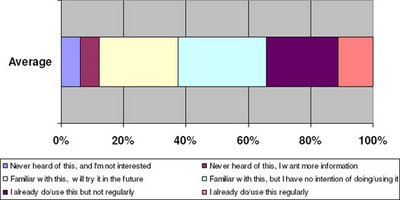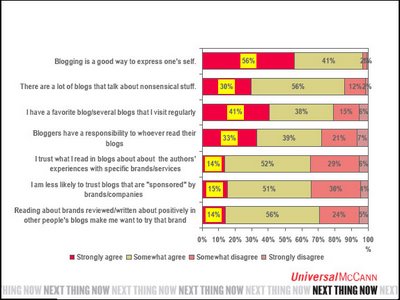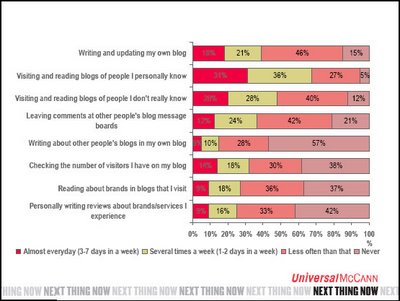Blogging Asia: A Windows Live Report
According to full report in The Star (30 November 2006) Page N33:
MOST BLOGGERS ARE WOMENLowyat.net picked it up here, with a more holistic perspective, covering other countries participating in the survey as well. I am not sure whether it is first or second hand, since PRNewswire has the same report. Anyway, let's proceed:
If you are a Malaysian and you have your own blog, the odds are that you're a woman, aged 25 or under.
Sixty-four percent of local bloggers are female and 74% of them are in that age group.
This is a finding of an international online survey involving more than 25,000 Microsoft MSN web portal visitors in August and September.
The survey, Blogging Asia: A Windows Live Report, was conducted in Hong Kong, India, South Korea, Malaysia, Singapore, Taiwan and Thailand.
It is found that 41% of Malaysians who went online also blogged.
Malaysia's bloggers primarily do it for entertainment and to share their lives with family and friends.
"Blogging has moved into the mainstream in Asia and Malaysia, and has become a popular way to stay in touch with family and friends," said Grant Watts, Microsoft South-East Asia general manager for online services group.
The survey found that 56% of Malaysians blogged to express passionately held views, while 49% blogged to keep friends and family updated.
Some 34% just like having a little corner of cyberspace to call their own.
Only a small number, about 3%, said they were practising "citizen journalism".
As for blog-reading habits, 63% of respondents said that they read blogs for entertainment, while technology, travel and music were the most widely read blog topics across Asia and in Malaysia.
The majority of blog readers, 81%, are most interested in blogs written by friends or family.
Far behind in popularity are blogs by business leaders and politicians garner the least interest.
Blog readers said they looked for good writing and plenty of pictures.
Stat: Nearly half of those online in Asia have a blog, 74% find blogs by friends/family to be most interestingIt is interesting that the second report highlighted this whilst The Star did not:
Stat: Young people and women dominate (except India where it is overwhelmingly a male domain)
Stat: 50% believe blog content to be as trustworthy as traditional media
Stat: 41% spend more than three hours a week blogging
Stat: More than 40% have less than 10 visitors per week
Stat: 55% of bloggers in Asia were found to be female and 45% male.
Stat: 20% of Malaysians voted for Blogs focusing on politics, compared to 14% on average across Asia
Politicians fared poorly across the region with only 14% interested in reading their blogs except in Malaysia where they were quite popular with 20% listing this type of blog as being of interest.Note of caution though: the sample involves only Microsoft MSN web portal visitors and may not be representative of the whole Malaysian blogosphere.






